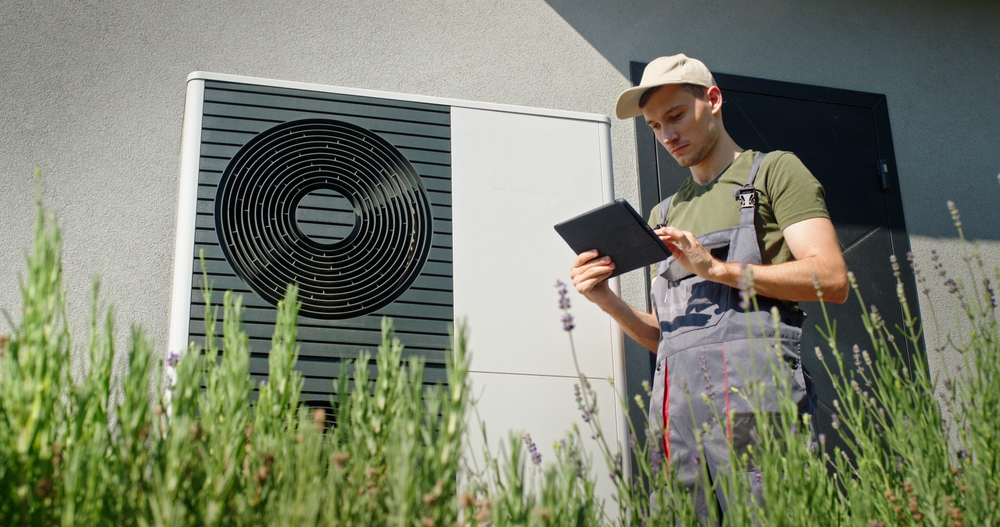Is an Air Source Heat Pump Worth it for my Business?
Some say that switching to a commercial air source heat pump can be a costly investment. So, how beneficial will it be? How soon will you look to see the benefits of it?
In this blog, we will look to answer the question ‘Is an air source heat pump worth it for my business?’
At Helec, we proudly offer multiple services to support building projects using renewable, sustainable, and low-carbon technologies. Our 17 years of experience provide us with the expertise to professionally handle the services of design and consultation, all the way to installation and performance monitoring.
Does solar power make more energy than an air source heat pump?
Both technologies are renewable energy sources, that work in different ways. Their effectiveness is mostly subject to where they are installed, as they both use naturally occurring energy which may vary depending on where in the country it is.
- Solar power: Solar PV panels convert sunlight into electricity, which can be used to power your home or business.
- Air source heat pump: Air source heat pumps extract heat from the outside air and transfer it indoors, providing space heating, heat domestic hot water, or deliver cooling.
While both technologies can help you reduce your reliance on fossil fuels and lower your energy bills, their suitability depends on various factors such as your location, energy needs, and available space.
Can I use an air source heat pump with solar panels?
Yes, air source heat pumps and solar power can be used together on the same building. In fact, combining these two technologies can provide significant energy savings and environmental benefits.
Here’s how they can work together:
- Heating and cooling: The air source heat pump can provide heating and cooling for your building, while the solar panels can generate electricity.
- Energy storage: Excess solar energy can be stored in batteries or used to power other appliances or systems in your building.
- Reduced grid reliance: By using solar power to generate electricity and an air source heat pump for heating and cooling, you can reduce your reliance on the grid and potentially lower your energy bills.
- Environmental benefits: Both solar power and air source heat pumps are renewable energy sources, which means they produce fewer greenhouse gas emissions than traditional fossil fuelled energy sources.
When considering combining air source heat pumps and solar power, it’s important to consult with a qualified energy efficiency expert to determine the best system for your specific needs and budget.
They can help you assess your energy consumption, evaluate your property’s suitability for solar panels, and design a system that maximises your energy savings.
Is an Air Source Heat Pump worth it for my business?

Air source heat pumps can provide a range of benefits for a business owner. However, the first challenge is to ensure it can be installed and be effective. Let’s take a look at this process, after which, we will share the benefits an air source heat pump will have for your business.
Air source heat pumps are typically installed outdoors, usually on the roof or in an outdoor space on site. They require a connection to the electricity grid and a ‘wet hot water’ pipe system to distribute heat throughout the building.
Here’s a breakdown of the installation process:
- Site assessment: A technician will assess your property to determine the best location for the outdoor unit. Factors such as noise levels, aesthetics, and access to electricity should be considered.
- Installation of outdoor unit: The outdoor unit(s) will be installed on a secure base, such as a concrete slab or metal frame.
- Pipework installation: A pipe system will be installed to connect the outdoor unit to the indoor heat exchangers. This system may involve drilling through walls or ceilings.
- Indoor unit installation: The indoor buffer vessel is linked to either , radiators or fan coils, which will be installed throughout the building.
- Electrical connection: The outdoor and indoor units will be connected to the building MCCB which is also connected to the local electrical grid.
- Testing and commissioning: The system will be tested to ensure it is working properly and meets the manufacturers statedefficiency standards.
Once your air source heat pump is in operation, you can expect to eventually see benefits including:
Energy efficiency
Reduced carbon footprint
Government incentives
Many governments offer financial incentives, such as grants or HMRC tax breaks, to encourage the adoption of renewable energy technologies. These incentives can help offset the initial cost of installing an air source heat pump. (Please check with official .Gov sites for clarification)
Increased property value
Versatility
Low maintenance
When should air source heat pumps not be used?
While air source heat pumps are a versatile and efficient heating and cooling solution, they may not be the best option for all situations. Here are some factors to consider:
- Extremely cold climates: Air source heat pumps can become less efficient in extremely cold climates, as they may struggle to extract enough heat from the outside air. In these regions, ground source heat pumps or traditional heating systems may be more suitable.
- Limited outdoor space: Air source heat pumps require outdoor units that can be quite large. If you have limited outdoor space, this may be a constraint.
- Noise considerations: Air source heat pumps can produce noise, particularly when operating at high speeds. This may be a concern in areas where noise pollution is a significant issue.
- Building insulation: If your building has poor insulation, it may require more energy- to heat or cool, which could offset the energy savings from an air source heat pump.
- Initial cost: While air source heat pumps can be cost-effective in the long run, the initial investment may be higher than traditional heating and cooling systems.
It’s important to carefully evaluate these factors and consult with a qualified energy efficiency expert to determine if an air source heat pump is the right choice for your specific needs. By consulting with an expert, you will be closer to finding the best solution for your situation, rather than making an investment that may not work for you.
Invest in an air source heat pump for your business

We hope to have provided everything you need to know by answering the question ‘Is an air source heat pump worth it for my business?’. For more information on our financing options, feel free to click the link below for our contact information, so you can start your journey with us today.
The team here at Helec thanks you for taking the time to read our blog. If you have any further questions, you can contact us here. Alternatively, if you want to enquire about our expert services or for more information on our solutions, click here.
Our wide range of services enables us to provide consultation, installation, and maintenance if you require it.
Our expertise provides us the ability to offer the following energy solutions:
- Combined heat and power packages
- Complete CHP service and maintenance packages
- Thermal stores and buffer vessels
- Ground source heat pumps
- Solar thermal systems
- Large district residential heating systems
And more. See how Helec can help you today.
